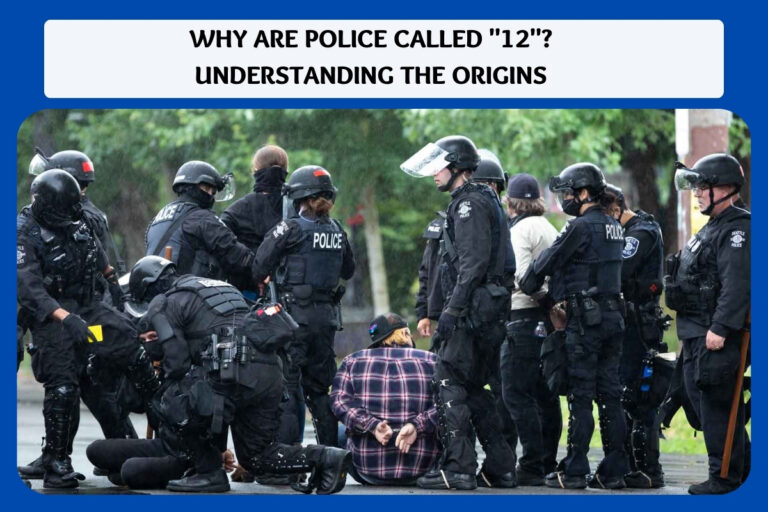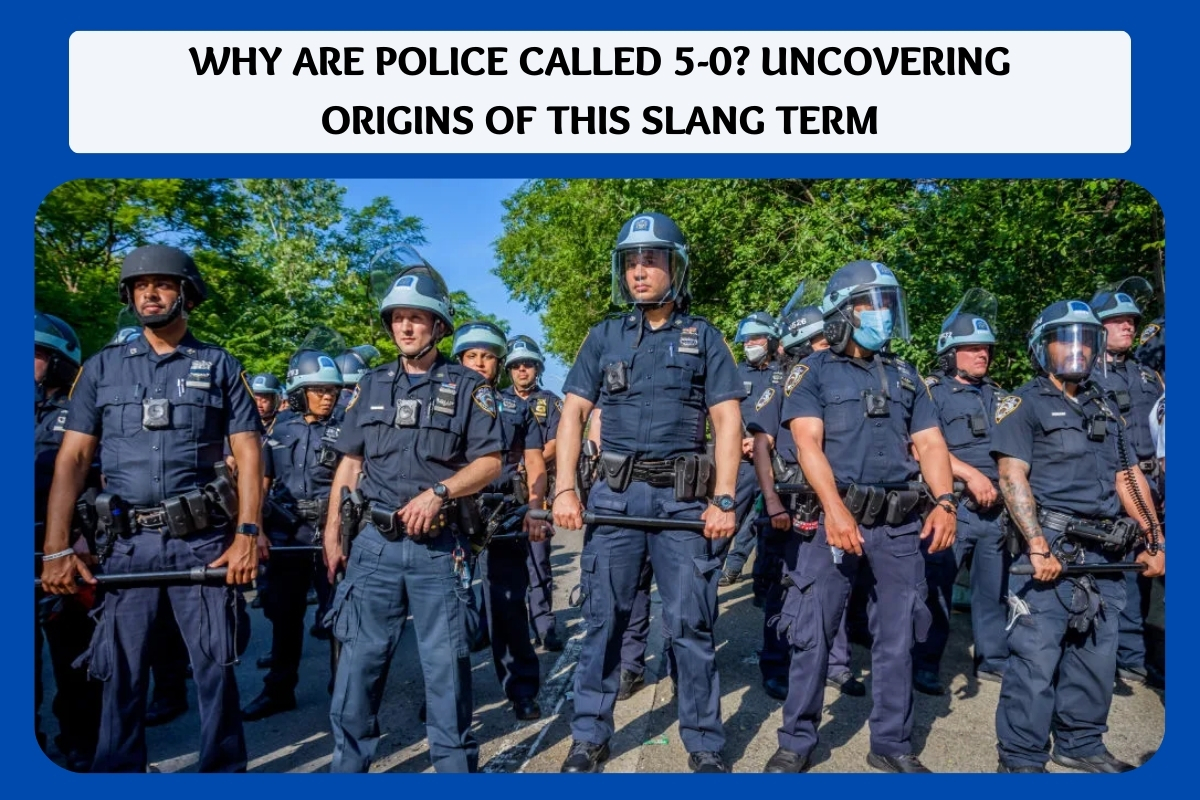Ever wondered why police are sometimes referred to as "12"? Well, buckle up, because we’re diving deep into the history, culture, and slang behind this term. It’s not just a random number—it’s got layers, and we’re about to peel them back one by one.
Let’s face it, slang is everywhere, and sometimes it feels like there’s a whole secret language floating around out there. When someone says “12,” you might think they’re talking about a dozen eggs or maybe even lunchtime. But in certain circles, “12” means something entirely different: the police. So how did this happen? What’s the story behind it? Stick with me, because this is gonna get interesting.
This article isn’t just about answering the question “Why are police called 12?” It’s also about exploring the world of codes, symbols, and hidden meanings that shape the way we communicate. Whether you’re into hip-hop culture, street slang, or just plain curious, you’re in the right place. Let’s roll!
Read also:Sarah Hyland Nude Setting The Record Straight And Celebrating A Talented Actress
Table of Contents
- The History Behind "12"
- Where Did the Slang Come From?
- Cultural Impact of the Term
- Understanding Police Codes
- The Role of Hip-Hop in Popularizing "12"
- Common Misconceptions About "12"
- How "12" Is Used Today
- Legal Implications of Using Slang
- The Psychology Behind Slang Adoption
- Wrapping It Up
The History Behind "12"
So, let’s start at the beginning. The term “12” as a reference to police has roots that go way back. Back in the day, before smartphones and social media took over our lives, people relied on radios and walkie-talkies to stay connected. These devices used specific codes to communicate messages quickly and efficiently. One of these codes was "10-12," which stood for "presence of plainclothes officers" or simply "police nearby."
Over time, the "10-" part got dropped, leaving just "12" as shorthand for law enforcement. It’s kind of like how "OMG" became a thing—it started out as a longer phrase but eventually got shortened for convenience. But here’s the thing: convenience isn’t always innocent. As we’ll see later, the use of "12" has sparked debates about its implications in different contexts.
How Codes Shaped Communication
In the early days of radio communication, police departments developed a system of "10-codes" to streamline their conversations. Each code represented a specific situation or instruction. For example:
- 10-4: Acknowledgment or confirmation
- 10-20: Location or position
- 10-12: Presence of plainclothes officers
These codes were designed to save time and avoid misunderstandings, especially in high-pressure situations. However, they also created a kind of insider language that outsiders had to decipher. And let’s be honest, humans love decoding secrets—it’s kind of our thing.
Where Did the Slang Come From?
Now that we’ve covered the official origins of "12," let’s talk about how it entered the world of slang. Slang is like a living organism—it evolves, adapts, and spreads depending on who’s using it and why. In this case, "12" found its way into popular culture through music, movies, and even everyday conversations.
One of the main drivers of its popularity was hip-hop. Artists like N.W.A, Public Enemy, and others used "12" in their lyrics to describe encounters with law enforcement. By doing so, they gave the term a new layer of meaning—one that reflected the realities of their communities. It wasn’t just about the police anymore; it was about power dynamics, systemic issues, and personal experiences.
Read also:Danielle Fishel Nude Unveiling The Truth Behind The Clickbait Sensation
From Radio Codes to Street Talk
Think about it: when you hear someone say “Watch out for 12,” it’s not just a warning—it’s a statement. It carries weight, history, and emotion. That’s what makes slang so powerful. It’s not just words; it’s a reflection of culture, identity, and resistance.
But here’s the kicker: not everyone uses "12" in the same way. In some places, it’s a casual term that gets thrown around without much thought. In others, it’s a loaded word that carries political and social significance. Context matters, and that’s something we’ll explore more in the next section.
Cultural Impact of the Term
Language is more than just communication—it’s a tool for shaping reality. When we adopt certain terms or phrases, we’re making a statement about who we are and what we believe. That’s definitely true for "12." Over the years, it’s become a symbol of both unity and division, depending on your perspective.
In some communities, "12" is a rallying cry. It’s a way of acknowledging the challenges faced by people of color, immigrants, and other marginalized groups. For others, it’s a source of frustration or even fear. After all, not everyone views the police in the same light. And that’s where things get complicated.
Unity vs. Division
The beauty—and the challenge—of slang is that it can mean different things to different people. For some, "12" is a reminder of resilience and solidarity. For others, it’s a reminder of conflict and mistrust. It’s all about perspective, and that’s something we need to respect if we want to have meaningful conversations about these issues.
Take a moment to think about your own relationship with the term. Do you use it? If so, why? What does it mean to you? These questions might seem simple, but they’re actually pretty profound. They force us to examine our biases, assumptions, and values—and that’s never a bad thing.
Understanding Police Codes
Before we move on, let’s take a closer look at police codes. As we mentioned earlier, "10-12" was one of many codes used by law enforcement agencies to communicate efficiently. But what about the others? Here’s a quick rundown of some common police codes:
- 10-7: Out of service
- 10-9: Repeat message
- 10-23: Stand by
- 10-27: Check for wanted persons
These codes might sound like gibberish to the uninitiated, but to those in the know, they’re a vital part of the job. They help officers stay focused, organized, and safe in the field. Of course, like any system, they’re not perfect. Sometimes misunderstandings happen, and that’s where things can get tricky.
Why Codes Matter
Police codes aren’t just about efficiency—they’re about clarity. In high-stress situations, clear communication can mean the difference between life and death. That’s why training and standardization are so important. But here’s the thing: not everyone agrees on how these codes should be used. Some argue that they create unnecessary barriers between law enforcement and the communities they serve. Others believe they’re essential tools for maintaining order and safety.
The Role of Hip-Hop in Popularizing "12"
Let’s talk about hip-hop, because let’s be real—it’s one of the biggest influences on modern slang. From "yo" to "lit," hip-hop has given us countless words and phrases that have entered the mainstream. "12" is no exception. Artists like Kendrick Lamar, J. Cole, and Cardi B have all used the term in their music, bringing it to wider audiences and giving it new layers of meaning.
But here’s the thing: hip-hop isn’t just about entertainment. It’s also about storytelling, activism, and social commentary. When artists use terms like "12," they’re often making a point about the world around them. They’re shining a light on issues that might otherwise go unnoticed—or worse, ignored.
Music as a Mirror
Think of music as a mirror—it reflects the reality of the people who create it. When an artist talks about "12," they’re not just throwing out a random word. They’re sharing their experiences, their struggles, and their hopes. And that’s something we should all pay attention to, whether we’re fans of hip-hop or not.
Common Misconceptions About "12"
As with any slang term, there are plenty of misconceptions about "12." Some people think it’s just a random number with no real significance. Others assume it’s always used in a negative context. The truth is, it’s much more nuanced than that.
For example, not everyone who uses "12" is talking about conflict with the police. In some cases, it’s simply a way of acknowledging their presence. It’s like saying “Hey, they’re here” without going into all the details. Other times, it’s used humorously or sarcastically, depending on the situation.
Breaking Down the Myths
Here are a few common myths about "12" and why they’re wrong:
- Myth: "12" is always negative. Nope! It can be neutral, positive, or even playful, depending on how it’s used.
- Myth: Only certain groups use "12." While it’s true that the term is more common in certain communities, it’s not exclusive to any one group.
- Myth: "12" is outdated. Actually, it’s still widely used today, both in slang and in official contexts.
How "12" Is Used Today
So where does "12" stand in 2023? Well, it’s still going strong. You’ll hear it in songs, movies, TV shows, and even everyday conversations. It’s become part of the cultural lexicon, and that’s not likely to change anytime soon.
But here’s the interesting part: its meaning continues to evolve. In some circles, "12" is being redefined as a call for accountability and transparency in law enforcement. It’s no longer just about avoiding trouble—it’s about creating change. And that’s something we can all get behind.
Adapting to the Times
Language is always changing, and that’s a good thing. It means we’re growing, learning, and adapting to new realities. As we move forward, it’s important to remember that words have power—and that includes "12." How we choose to use it says a lot about who we are and what we stand for.
Legal Implications of Using Slang
Now, let’s talk about the elephant in the room: legal implications. Can using slang like "12" get you into trouble? The short answer is yes—but only if it’s used in a threatening or disruptive manner. Courts have ruled that freedom of speech doesn’t give you carte blanche to say whatever you want, whenever you want.
That said, most people use "12" in a completely harmless way. It’s only when it’s combined with other factors—like aggressive behavior or criminal activity—that it becomes a problem. So if you’re thinking about dropping "12" in your next conversation, just make sure you’re doing it in good faith.
Know Your Rights
Here’s a quick reminder: you have the right to free speech, but you also have a responsibility to use it wisely. If you’re unsure about how a particular term might be perceived, it’s always a good idea to err on the side of caution. After all, it’s better to be safe than sorry.
The Psychology Behind Slang Adoption
Why do we adopt certain slang terms and not others? It’s a question that’s fascinated linguists, psychologists, and sociologists for years. The truth is, it’s a complex process that involves a lot of different factors.
For starters, slang often reflects the values and priorities of the people who use it. If a term resonates with a particular group, it’s more likely to stick around. But it also has to be catchy, easy to pronounce, and versatile enough to be used in different


